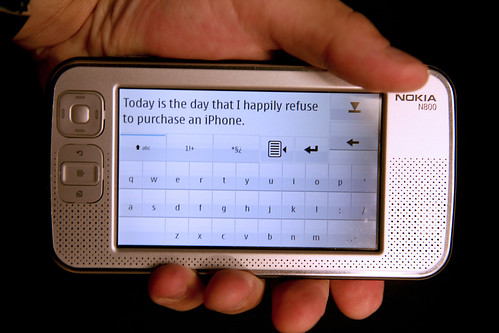Developers Swallowing Apple's Crumbs
 Apple is about to repeat the same mistake with the iPhone that it committed with the Mac twenty-five years ago, and Google is going to end up with the lion's share of application sales.
Apple is about to repeat the same mistake with the iPhone that it committed with the Mac twenty-five years ago, and Google is going to end up with the lion's share of application sales.
That said, most developers currently prefer the iTunes app store system for a number of reasons:
- customers know and understand the concept;
- it's easy for customers to discover apps;
- Apple handles all the back-office unpleasantness like figuring out how much of a cut each party gets; and
- worst of all, developers fall for the idea that the app store can make them rich.
There are, of course, legitimate concerns with the Google-championed alternative, where customers get their apps straight off the Web.
- apps work well on the iPhone because they're built specifically for the iPhone, not for a standard which can be interpreted slightly differently by different manufacturers;
- it's harder to find apps, find reviews for those apps, and ensure those apps are safe on the Web -â€" because the app store vets every app before they get close to the customer;
- Google Checkout is an "unacceptable" experience; and
- worst of all, Android apps seem slower.
- developing Web apps is less expensive than developing for the iPhone, and;
- the apps can be sold in more places and used on more devices.
Mobile Web app developer shop Aumnia's Gregg Borodaty summed up the nascent power of Web-based apps thusly, for both developers and end users (who will, in the long run, determine the winning model):
The power of flexibility, the ability to design once for multiple handsets, the open nature of the Web, the control over content, and the reduced costs of maintenance and promotion will lead developers to push more and more functionality to the mobile Web. For users, the ability to freely move between handsets and carriers, as well as to have a seamless experience between their desktop and mobile device, will also lead users to favor the mobile Web over apps.Farsighted venture capitalist Fred Wilson noted in his blog that mobile apps on the Web
is the winning model, for Google, for the consumer, and for the mobile web. I'd like to see Apple emulate it, but they did not with the Mac twenty-five years ago and they may make the same mistake again. I hope not.Apple has a winning hand for the time being, so this is hardly the time for them to fold. Even on the Web, there is a split between those, like GetJar, who build platform-specific apps, and those who, like Google (and Handango), build apps for the mobile Web browser. Which would you bet on?
As VentureBeat's Paul Boutin notes, "in the long run, products and services built to fit open-browser standards have consistently won out over those that only run on certain devices."
Expect security concerns to be eased by vendors like MobileIron, especially on the enterprise side, and by better security features on mobile Web browsers themselves; another reason Google is pushing for standards-based browsers is to support the same features across all handset types, thus increasing consumer confidence and, ultimately, click-through rates.
Even the forthcoming Jesus Tablet, which will in all likelihood include elements of the iPhone and iPod Touch as well as other common computing and entertainment functions, will be better served by Web apps. Google is busily developing those apps, and the FCC will under no circumstances allow Apple to dictate what customers can download to their devices. Apple won't leave the field to its rivals, leaving it no choice but to join the open Web app world.